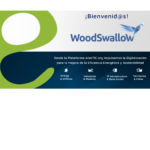The Internet of Things Chair has been presented, aimed at engineering students

The University of Seville (US) and WoodSwallow have signed a collaboration agreement for the creation of the Chair of the Internet of Things (IoT). The objective is the promotion of teaching and research activities related to IoT and energy management. With this new chair, the US already offers 37 company chairs.
The IoT Chair will be a collaborative space dedicated to activities related to training, divulgation and innovation in collaboration with professionals from the Higher Technical School of Engineering of Seville (ETSI), especially those from the Department of Electronic Engineering.
Internet of Thigns (IoT) University Chair
The signing ceremony of the agreement was attended by, among other personalities, the rector of the University of Seville, Miguel Ángel Castro, the general director of WoodSwallow, Manuel Álvarez, and professor Antonio Jesús Torralba, member of the Department of Electronic Engineering of the School Superior Technician of Engineering of the US and director of the chair.
The rector said that “the Internet of Things does not only provide personal assistance. The world of industry, commerce, and finance is transforming, digitizing itself and equipping itself with intelligence to face new challenges. The Internet of Things is the enabling engine of these technologies that are transforming the world, and whose most significant exponent is Artificial Intelligence”.
For Castro, the University of Seville “sees recognized in this Chair the high technological and research level of its university groups. And especially of its Higher Technical School of Engineering“. In this context, he expressed his satisfaction with the leading role of ETSI and praised the figure of the director of WoodSwallow, a graduate of the US, who “is a clear example of an entrepreneur who gives back to society, multiplied, what it has provided, and is also an example for other young graduates showing a path of success, promoting the excellence of the university and its training capacity”. “This Chair is an opportunity for students and research groups to have direct access to technology with great enabling potential. For our society, it is an opportunity to attract talent and access markets with high technological value”.
Innovation to be competitive in Andalusia

During the signing ceremony, the director of the chair, Professor Antonio Torralba, highlighted that “both the University of Seville and WoodSwallow believe that Andalusia must make a strong commitment to these industries in order to be competitive. We must invest in the training of students in these areas. Creating a point of union between research, teaching and the market”.
In addition, Torralba has stressed that, “within the world of IoT, smart metering of electricity, gas and water, are areas that will require a large number of specialized professionals in the coming years. In Andalusia there are already technology companies that are demanding this talent, as WoodSwallow”.
For his part, Manuel Álvarez, Telecommunications Engineer from the University of Seville and founder of WoodSwallow, pointed out that “the value of the IoT lies not only in the connection of devices, but also in the new services and business models that it facilitates (agriculture of precision, manufacturing 4.0 or intelligent mobility are some examples). Specifically, one of the industries that will benefit the most from the IoT will be energy, where measurement and communications are fundamental tools to promote energy efficiency and, thereby, combat climate change.”
Likewise, Álvarez explained that the company has a team in Seville of about 50 hardware, software and business engineers with extensive experience in the field of intelligent energy measurement (most of them graduated from the University of Seville).
The current energy context is increasingly complex and uncertain, caused by various internal and external factors such as the energy transition, climate change, digitization or the rise in gas and electricity prices (in part caused by the crisis of COVID-19 and the recent Russian invasion of Ukraine). The convergence over time of these factors stresses the transition of the sector towards a more sustainable and efficient model.






